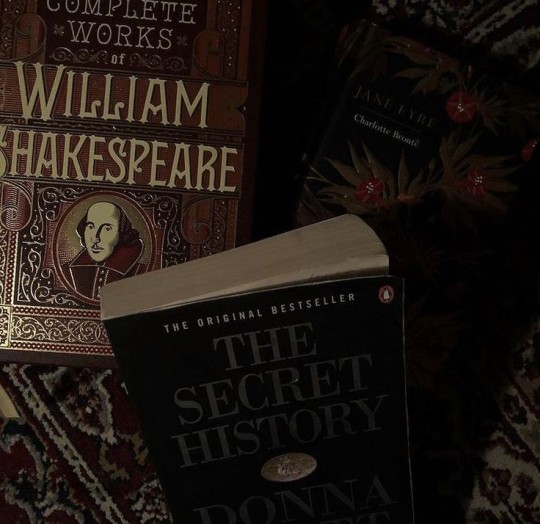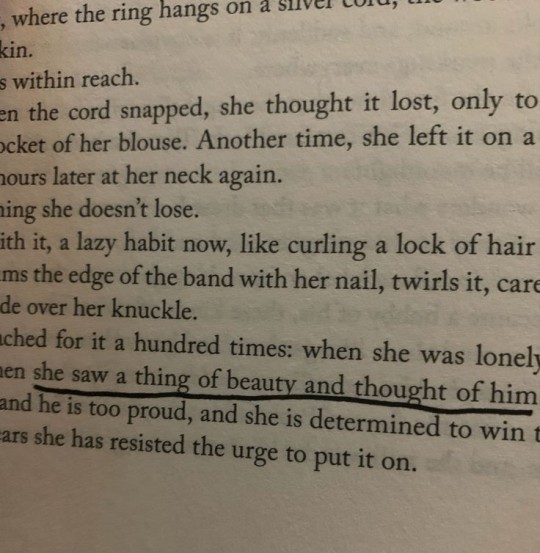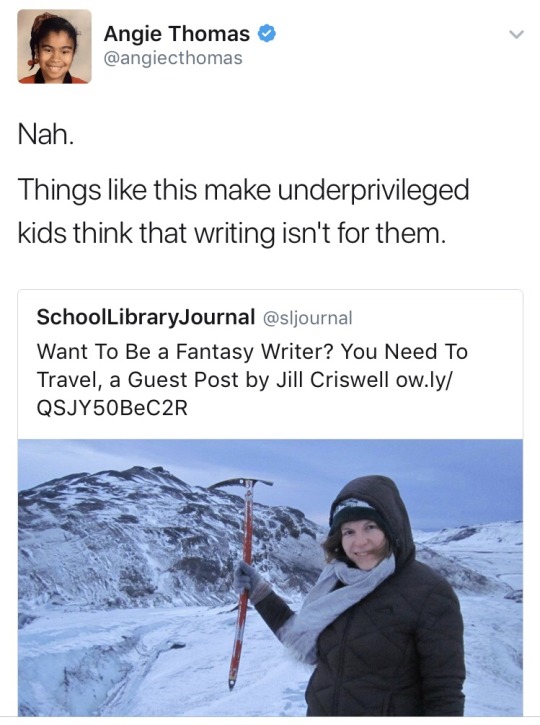Text








We are but a montage of melancholy and sinful hope
7K notes
·
View notes
Text
My roommate (the one who hates septum piercings so much they make her gag) thinks my art is the most disgusting and ugly shit on the planet, and every time I announce that I've sold a piece or gotten into a show, she makes the kind of facial expression you'd expect of someone eating chili at a live autopsy and says, "I'm glad you're having fun! :)"
85K notes
·
View notes
Text
Writing Tips
Punctuating Dialogue
✧
➸ “This is a sentence.”
➸ “This is a sentence with a dialogue tag at the end,” she said.
➸ “This,” he said, “is a sentence split by a dialogue tag.”
➸ “This is a sentence,” she said. “This is a new sentence. New sentences are capitalized.”
➸ “This is a sentence followed by an action.” He stood. “They are separate sentences because he did not speak by standing.”
➸ She said, “Use a comma to introduce dialogue. The quote is capitalized when the dialogue tag is at the beginning.”
➸ “Use a comma when a dialogue tag follows a quote,” he said.
“Unless there is a question mark?” she asked.
“Or an exclamation point!” he answered. “The dialogue tag still remains uncapitalized because it’s not truly the end of the sentence.”
➸ “Periods and commas should be inside closing quotations.”
➸ “Hey!” she shouted, “Sometimes exclamation points are inside quotations.”
However, if it’s not dialogue exclamation points can also be “outside”!
➸ “Does this apply to question marks too?” he asked.
If it’s not dialogue, can question marks be “outside”? (Yes, they can.)
➸ “This applies to dashes too. Inside quotations dashes typically express—“
“Interruption” — but there are situations dashes may be outside.
➸ “You’ll notice that exclamation marks, question marks, and dashes do not have a comma after them. Ellipses don’t have a comma after them either…” she said.
➸ “My teacher said, ‘Use single quotation marks when quoting within dialogue.’”
➸ “Use paragraph breaks to indicate a new speaker,” he said.
“The readers will know it’s someone else speaking.”
➸ “If it’s the same speaker but different paragraph, keep the closing quotation off.
“This shows it’s the same character continuing to speak.”
76K notes
·
View notes
Text
Random Names
Part IV
A list of random names that I've come across to give you some variety for your next characters.
Liana (f)
Danilo (m)
Selma (f)
Nelson (m)
Rasul (m)
Roxana/Roksana (f)
Faisal (m)
Tamino (m)
Saujanya (f)
Dawn (f)
Anwar (m)
Kuno (m)
Samira (f)
Delilah (f)
Anas (m)
Rahim (m)
Dimitra (f)
Cassius (m)
Lambert (m)
Tiziana (f)
Jolie (f)
Severin (m)
Mave (f)
Willa (f)
Alistair (m)
Lucian (m)
Rowan (f/m)
Mabel (f)
Gene (m)
Ramona (f)
More names!
724 notes
·
View notes
Text
A Quick Guide to Varying Sentence Starters
One of the things that really winds me up about my own writing is looking back and seeing a multitude of sentences beginning with “I” or “And” or “But”. I’m a messy first-drafter as it is and I do a lot of line edits, but it’s still takes up a significant portion of my time going back to change things.
So, I’m here today to share with you the ways I try to vary my sentence starters and some tips and tricks for drafting and edits”
-.-.-.-
We all know why it’s important to vary your sentence structure, and by extent, your sentence starters. Besides obvious intentional things such as creating tension, or specific mood/tone/atmosphere, we should be aiming to vary how we start sentences to keep the reader engaged and not it being repetitive.
This is especially important if you, like me, write in first person and begin a lot of sentences with things like “I was” or “I am” etc. Or if you have a habit of beginning sentences with characters’ names. But what other options do we have? Here are five general categories that I like to use:
ING WORDS
Coughing, she pushed her way through the blaze.
Smiling, he leaned in for a kiss.
SIMILIES (and other techniques)
Like the chattering of a typewriter, their eyes flittered over the group in front.
Sweeping in like a dove, she cut through the awkward conversation.
PREPOSITION
(beside, near, with, across, around, out, at, in, etc.)
On the starter’s whistle, I pushed forward.
Under the heavy fog, the streetlamp glowed valiantly
CONNECTIVE
(Because, but, and, despite, after, before, etc.)
After he left, I slipped the dagger back into its brace.
But I wasn’t about to give in now.
ED WORDS
Distracted, she let the ice cream fall from her hands.
Stunned by his words, they stopped in their tracks.
.-.-.-.
Obviously you can make these examples much more complex and attuned to your own styles! There are lots of other ways you can vary your sentence openers, these are just what I personally use - so hopefully you can get some use of them!
.-.-.-.
Hints and Tips!
Use the highlighting treatment! Go through your WIP and focus on your sentence openers. Select a different colour for each category (Blue for She/He/They/I starters, red for ED Words, yellow for ING words, as an example) and use it to help you see where you may need to add some more variation!
This also is a great exercise to do with a published book you really enjoy or by an author you admire - it’s a great learning experience!
Use a good mix of short, long, and medium sentences! If you find that your writing feels a bit samey or dry, even with varied openers, try changing the structure of the whole sentence itself!
Experiment and play around with word order and structure - free write for a few minutes every day and try something new! It’s all practice and even if it never sees the light of day in your WIP, it’s still a worthwhile thing to do!
.-.-.-.
I hope you’ve enjoyed this guide and/or found it useful!
If you’d like to request a particular guide, please pop into my inbox and leave a request!
#writing#writeblr#writing advice#writing resources#writing help#writing resource#writers#writer#quote#creative writing
3K notes
·
View notes
Text
Some people on this website learnt the word “trope” and let it settle comfortably into the vocabulary space that should have been occupied by the word “cliché”.
“Trope” is a neutral word. If a particular trope is overused ad nauseam, it becomes a cliché. Saying you hate tropes does not make any sense.
89K notes
·
View notes
Text
some of the best writing advice I’ve ever received: always put the punch line at the end of the sentence.
it doesn’t have to be a “punch line” as in the end of a joke. It could be the part that punches you in the gut. The most exciting, juicy, shocking info goes at the end of the sentence. Two different examples that show the difference it makes:
doing it wrong:
She saw her brother’s dead body when she caught the smell of something rotting, thought it was coming from the fridge, and followed it into the kitchen.
doing it right:
Catching the smell of something rotten wafting from the kitchen—probably from the fridge, she thought—she followed the smell into the kitchen, and saw her brother’s dead body.
Periods are where you stop to process the sentence. Put the dead body at the start of the sentence and by the time you reach the end of the sentence, you’ve piled a whole kitchen and a weird fridge smell on top of it, and THEN you have to process the body, and it’s buried so much it barely has an impact. Put the dead body at the end, and it’s like an emotional exclamation point. Everything’s normal and then BAM, her brother’s dead.
This rule doesn’t just apply to sentences: structuring lists or paragraphs like this, by putting the important info at the end, increases their punch too. It’s why in tropes like Arson, Murder, and Jaywalking or Bread, Eggs, Milk, Squick, the odd item out comes at the end of the list.
Subverting this rule can also be used to manipulate reader’s emotional reactions or tell them how shocking they SHOULD find a piece of information in the context of a story. For example, a more conventional sentence that follows this rule:
She opened the pantry door, looking for a jar of grape jelly, but the view of the shelves was blocked by a ghost.
Oh! There’s a ghost! That’s shocking! Probably the character in our sentence doesn’t even care about the jelly anymore because the spirit of a dead person has suddenly appeared inside her pantry, and that’s obviously a much higher priority. But, subvert the rule:
She opened the pantry door, found a ghost blocking her view of the shelves, and couldn’t see past it to where the grape jelly was supposed to be.
Because the ghost is in the middle of the sentence, it’s presented like it’s a mere shelf-blocking pest, and thus less important than the REAL goal of this sentence: the grape jelly. The ghost is diminished, and now you get the impression that the character is probably not too surprised by ghosts in her pantry. Maybe it lives there. Maybe she sees a dozen ghosts a day. In any case, it’s not a big deal. Even though both sentences convey the exact same information, they set up the reader to regard the presence of ghosts very differently in this story.
36K notes
·
View notes
Text
30 ABBA inspired prompts

Feel free to use and reblog!
Mamma Mia - your character falls for the same flawed person again and again
Dancing Queen - your character decides to enjoy themself and just have fun tonight without wasting another thought on tomorrow
Waterloo - your character finally gives in to their feelings and let their loved person into their life
Angeleyes - your character sees their ex with someone else and notices how they fall for them just the same way as they had done
People Need Love - your character starts seeing the love in every corner of the world around them
Gimme! Gimme! Gimme! - your character is lost in their lonely darkness at night, wishing for someone to save them from themself
Bang-A-Boomerang - your character learns that they receive love if they give away kindness
SOS - your character feels their s/o slipping away slowly
Don't Shut Me Down - your character comes back after a long time and asks to be allowed back in the other's life
Voulez-Vous - your character has a non-committal encounter with a familiar person
Take A Chance On Me - your character doesn't grow tired of trying everything to win the other's heart
The Winner Takes It All - your character tries accepting that their s/o now gives their love to someone else
My Love, My Life - your character realises that it is over and the sweet memories seem like another life altogether
Money, Money, Money - your character works hard for their keep and imagines how different life could be had they pulled different strings
Slipping Through My Fingers - your character has a hard time seeing their child grow up and slowly leaving the nest
Chiquitita - your character tries to lift the spirits of a sad person close to them
Super Trouper - your character is homesick for their s/o and is excitedly awaiting the reunion
Lay All Your Love On Me - your character experiences rushes of jealousy since Person B stepped into their life and doesn't want anything but all of B's love
As Good As New - your character's love for their s/o grows with every day, even after years spent together
If It Wasn't For The Nights - your character is hopelessly lost in thoughts about their crush/ex/love when they're without them at night
Knowing Me, Knowing You - your character finally breaks up with their s/o after they agreed it was for the best
Ring Ring - your character impatiently waits for a sign from their s/o
I Do, I Do, I Do, I Do, I Do - your character doesn't hold back when they confess their love to their love interest
Fernando - your character reminisces a sweet memory with their ex/love
I Have A Dream - your character has an inner light that guides them through the hard reality
Honey, Honey - your character meets a much-talked-about playboy/playgirl and can't help but fall for their charm
The Name Of The Game - your character opens up to another person for the first time and tries gauging if the other is serious with them
I Still Have Faith In You - your character realises after many years how close they are with another person because their shared spirits didn't waver over all this time
The Day Before You Came - your character still remembers the day before they met their love in detail
When All Is Said And Done - your character crosses paths with another person and they already sense that it will be a temporary but pleasant shared time
828 notes
·
View notes
Text
Me: *seeing a doctor* Did the test come back positive?
Doctor: *has a doctorate in English Lit* I’m sorry, it’s a little more challenging than we thought. We analyzed your imagery, and it appears that you symbolize the fleeting nature of the American dream
Me: oh god
4K notes
·
View notes
Text
list of mundane things that feel like ancient human rituals
cleaning or wipe your bare feet
breaking off a piece of bread and handing it to someone
putting the weight of a basket on your hip or head
eating nuts or berries while hunched over close to the ground
seeing something startling just out of your line of sight and very quickly stepping or leaping on to a larger object to get a better view
cupping your hands into running water to wash your face
the unanimous protection of a baby or child in a public space where women are present
when an elderly woman laughs and grips your forearm tightly
154K notes
·
View notes
Text

TRUTH. What you need is imagination, and you don’t need to go anywhere to use it.
56K notes
·
View notes
Text
“Words can be like X-rays if you use them properly — they’ll go through anything. You read and you’re pierced.”
— Aldous Huxley | Ko-Fi | Patreon
283 notes
·
View notes
Text
“We put a family together, I got an understanding of how terrible love can be. You wish you hated those people, your wife and children, because you know the things the world will do to them, because you have done some of those things yourself.”
Everything Ravaged Everything Burned - Wells Tower
#writing#creative writing#writers#love#hate#family#world#terror#romance#heart#heartache#quote#feelings#literature#books#hatred#fear#quotes#love quotation#dark academia#light academia#dark acadamia aesthetic#academia
0 notes
Text
latin phrases i wish to remember:
♡ "veni, vidi, vici." - i came, i saw, i conquered.
♡ "vivamus, moriendum est." - let us live, for we must die.
♡ "ergo dum me diligis." - so long as you love me.
♡ "alis volat propriis." - she flies with her own wings.
♡ "sic mundus creatus est." - thus the world was created.
♡ “aut inveniam viam aut faciam.” - i shall either find a way, or make one.
8K notes
·
View notes
Text
There’s a trope known as “What You Are In The Dark”, and it’s really useful for showing your audience what kind of person a character is.
It’s essentially where a character, usually- but not always- the protagonist, is in a uniquely tempting situation. They have the opportunity to do something they want to do, something that’s selfish and usually, objectively wrong. They WANT to do it on some level, it’s a benefit, and there won’t be any negative consequences for them. And the cherry on top: Nobody who’s opinion they care about will ever know what they’ve done.
Sometimes, it’s something like not saving someone who was horrible to you. Sometimes it’s a little more active, like an alter ego they can use to express their desires. But it’s always, metaphorically speaking, “in the dark”. Nobody sees, or anyone that sees doesn’t know it’s them, or nobody they care about sees and knows it’s them.
What the character does in that situation tells the audience who that character really is. What they’re like under any facades or pleasantries they may put up. What you are in the dark defines you. You are at your most YOU when nobody is looking.
Usually, if the character is a hero, they’ll throw away this opportunity. They’ll face the little voice whispering, “No one will ever know,” and tell it, “I’LL know.” Because they know whatever they have the chance to do is wrong, and they know they’d be torn up about it. Even with no external restrictions, there’s a little guiding force telling them to do good, or at the very least, NOT do evil.
If the character takes the opportunity to do something bad when no one is looking, they’re not a good person.
And yes, this trope CAN be invoked accidentally.
6K notes
·
View notes
Text
me, poking an uncooperative character with a stick: who are you and what is your personality
2K notes
·
View notes
